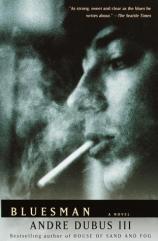Bluesman
Review
Bluesman
In
his 1993 novel BLUESMAN, Andre Dubus III explored what would later
become one of the major themes of his 1999 breakout novel, HOUSE OF
SAND AND FOG. The success of the latter novel, a National Book
Award finalist and a pick for Oprah's Book Club, has led Vintage
Contemporaries to reprint BLUESMAN, giving readers a chance to
enjoy the earlier book. While not as stunning an accomplishment as
HOUSE OF SAND AND FOG, BLUESMAN is still a powerful novel full of
memorable characters caught up in desperate situations largely of
their own making.
As the novel opens Leo Suther is a junior in high school, just a
few months shy of his 18th birthday. Because the year is 1967 and
the Vietnam Conflict rages on, that birthday is fraught with
meaning; but Leo has his mind on other things, including a fellow
student named Allie Donovan and the blues music his father Jim and
a family friend produce once a week in the Suther home. Leo, whose
mother Katie Faye died when he was just a little boy, is soon
involved with Allie and learning to play blues harmonica. He also
accepts a job on a construction crew headed up by Allie's father,
Chick Donovan, a devout communist who sets out to change the
world.
The plot points --- the consequences of Allie and Leo's sexual
relationship, the result of Chick Donovan's fervor for the
communist cause, the loneliness of Jim Suther as he raises his son
without the love of his life beside him --- all coalesce around the
idea that fuels both of Dubus's novels: Try as we might, we have
trouble communicating our desires and motivations to others. But
while HOUSE OF SAND AND FOG makes that point about people who come
from different backgrounds and who are strangers to one another,
BLUESMAN reminds the reader that often those closest to us are
equally hard to reach.
Perhaps the most accurate communication in the novel is
accomplished by a character who is no longer alive. As Leo begins
to remind his father more and more of Katie Faye, Jim decides to
share with his son many of the writings and photographs she left
behind. Among them is a journal Katie Faye kept as she struggled
with the illness that eventually took her life. While this device
seems a tad forced, Dubus uses it to introduce the particulars of
Jim and Katie Faye's romance and to provide Leo with the motivation
for his fateful decisions late in the book. Ironically, even this
static, written communiqué from beyond the grave leads to a
series of events far removed from what Leo's mother would have
wanted for her husband and son.
Dubus is relentless in his portrayal of lives irrevocably changed
by misinterpreted attempts to express love, anger, and the
remaining range of human emotions. Only in music can Leo and Jim
ultimately express the feelings they have for one another and for
the situations in which they find themselves. As Dubus makes clear,
only the blues capture the essence of the pain we often create for
ourselves.
Reviewed by Rob Cline (RJBCline@aol.com) on January 21, 2011
Bluesman
- Publication Date: February 13, 2001
- Genres: Fiction
- Paperback: 336 pages
- Publisher: Vintage
- ISBN-10: 0375725164
- ISBN-13: 9780375725166




